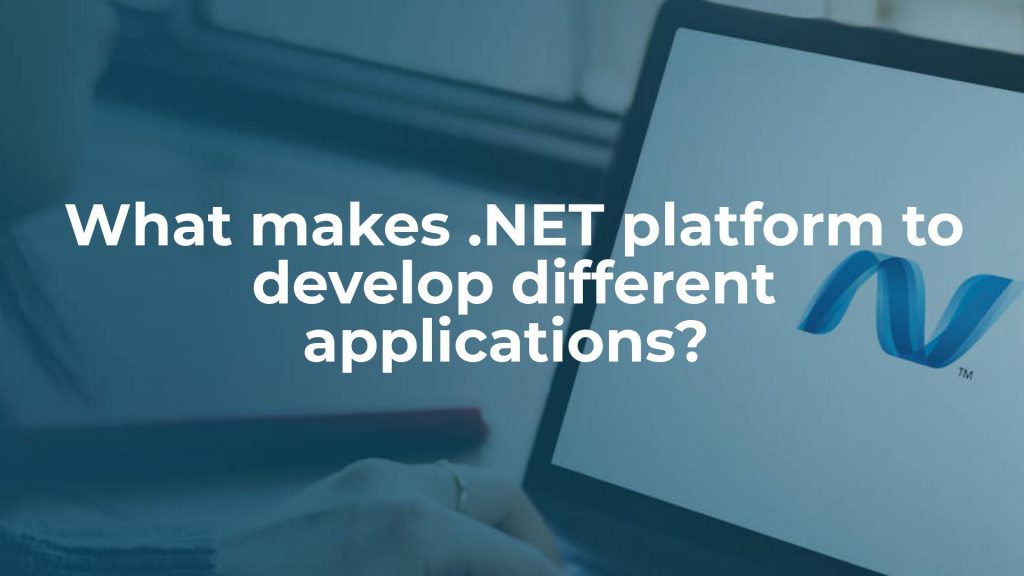Why You Must Go With Microsoft .NET Framework For Web Development?

Author : Arul Selvan 17th May 2019
.NET was developed by Microsoft to provide interoperability across several programming languages. It is a software framework that runs on Microsoft Windows. It comes with the Framework Class Library, a large class library, which enables Microsoft .NET Framework to provide the interoperability feature.

Let’s dive into the million-dollar question “Why You Must Go With Microsoft .NET Framework For Web Development?”, and find out the answers.
RICH OUT OF THE BOX FUNCTIONALITY
The Microsoft .NET Framework provides a rich set of functionality out of the box. It contains hundreds of classes that provide a variety of functionality ready to use in your applications. It means that, as a developer, you need not go into low-level details of many operations. The operations include file IO, network communication, and so on.
EASE OF WEB APPLICATIONS DEVELOPMENT
ASP.NET is a technology available on the .NET platform for developing dynamic and data-driven web applications. It comes with an event-driven programming model (similar to Visual Basic 6) that is capable of simplifying the process of web page development (now called as web forms) with the complex user interface. Its server controls provide advanced user interface elements (like calendar and grids) that save a lot of coding from programmer’s side.
OOPs SUPPORT
The website development community is well aware of the advantages of Object Oriented Programming. .NET offers a fully object-oriented environment. “Object is the mother of all” is the philosophy of .NET framework. Languages like Visual Basic.NET now support many of the Object Oriented (OO) features that were lacking traditionally. Even primitive types like integers and characters can be treated as objects – something not available even in OO languages like C++.
MULTI-LANGUAGE SUPPORT
One must agree that whenever a new language or environment comes to the market, existing skills are outdated. Thus, it naturally increases the cost of training and learning curve. .NET framework provides something attractive in this area. It supports multiple languages.
It means that, if you have skills in C++, you need not throw them away. Just mold them to suit the .NET environment. Commonly used programming languages are – Visual Basic.NET, C# (pronounced as C-sharp), Jscript.NET and Managed C++ (a dialect of Visual C++) and also supports 30 plus programming languages.
There are quite a few vendors working on developing language compilers for other languages (20+ language compilers are already available). The best part about the multi-language support is the fact that even though the syntax of each language is different, the basic capabilities of each language remain at par with one another.
MULTI-DEVICE SUPPORT
Modern lifestyle is increasingly embracing mobile and wireless devices such as PDAs, mobiles, and handheld PCs. .NET provides a suitable and robust platform for programming such devices. .NET Compact Framework and Mobile Internet Toolkit are setting an example in this space.
AUTOMATIC MEMORY MANAGEMENT
While developing applications, developers must have an eye on system resources like memory. Memory leaks were one of the major reasons for the failure of applications. Microsoft .NET Framework fixes this issue by handling memory on its own and thus makes the life of developers easy. The garbage collector takes care of clearing the unused objects at appropriate intervals.
COMPATIBILITY WITH COM AND COM+
Before the inception of .NET, COM was the de-facto standard for componentized software development. Companies have invested a lot of money and efforts in developing COM components and controls. The best part is – you can still use COM components and ActiveX controls under .NET.
It enables you to use your existing investments in .NET applications. It still relies on COM+ for some features, including transaction management and object pooling. In fact, it comes with enhanced declarative support for configuring COM+ application right from your source code. Thus, your COM+ knowledge still remains as a valuable asset.
STRONG XML SUPPORT
Nowadays it is rare to find a programmer who is unaware of XML. XML has gained such strong support from the industry that almost all of the vendors have released some upgrades or patches to their existing software to make it “XML compatible.”
Currently, .NET is the only platform built with XML right into the core framework. Moreover, to provide support for manipulating and transforming XML documents, it provides XML web services based on the standards like HTTP, XML, and SOAP.
EASE OF DEPLOYMENT AND CONFIGURATION
Deploying windows applications that used COM components were once a tedious task. Since .NET does not require any such registrations, deployment is made simple. It makes XCOPY deployment feasible. The configuration is another area where the web application framework ASP.NET (also .NET) shines over traditional languages.
The configuration is done using special files having special XML vocabulary. Since almost all of the configuration is done with the help of configuration files, there is no need to sit in front of an actual machine and configure the application manually. It is more useful in case of web applications; simply FTPing new configuration file makes necessary changes.
SECURITY
Windows platform had gone through a series of criticisms for poor security mechanisms. Hence, Microsoft has taken necessary measures to make the .NET platform safe and secure for enterprise applications. Its features such as code access security, type safety, and role-based authentication make the overall application more robust, and secure.
Leveraging all these functionalities .NET is capable of developing modern applications. The strong XML support and security features help .NET stand a class apart from the rest of the frameworks.
We have hands-on experience in building modern, robust, and secure web applications using the .NET framework. Get in touch with us to build your dream web application by sending an email to media@techaffinity.com.
